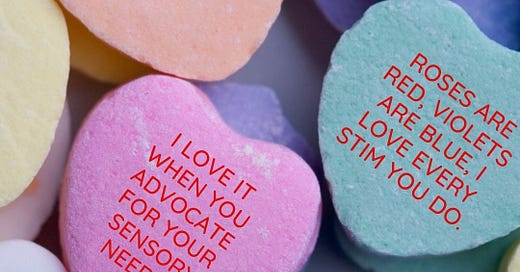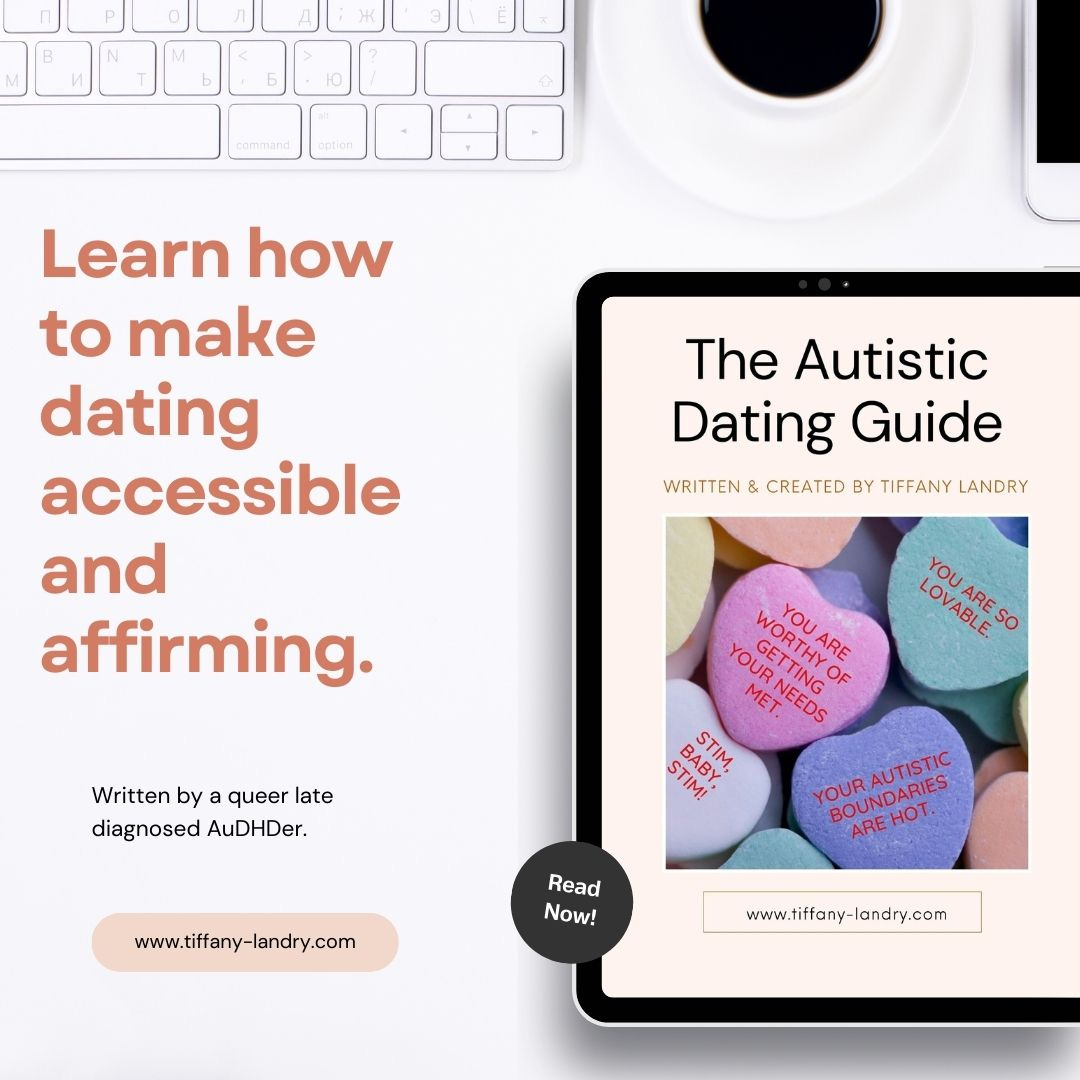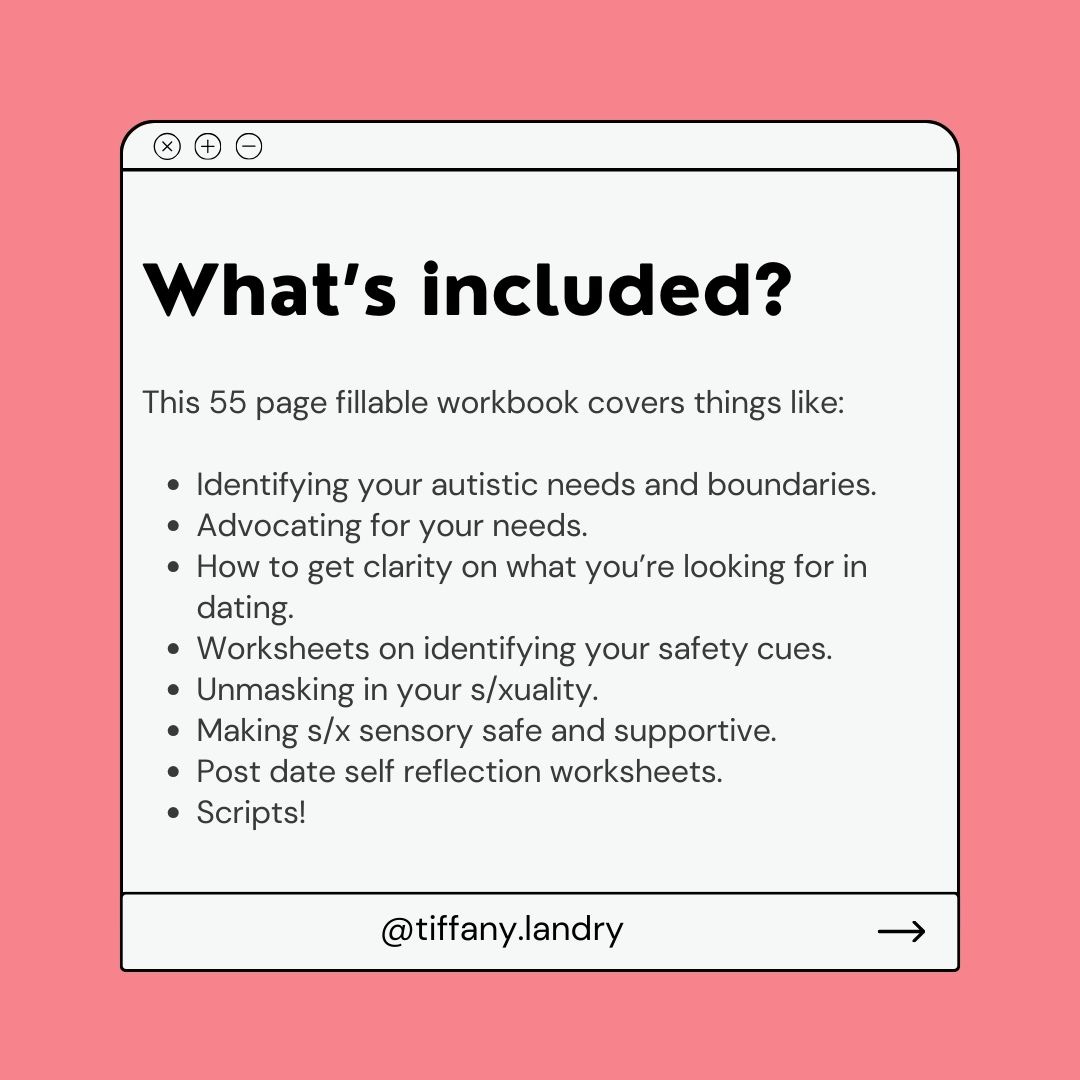Hi all! I’m excited to share this piece with you :) In today’s newsletter I’m going to be sharing some dating experiences as a late diagnosed autistic and how to rebuild self trust after experiencing traumatic invalidation. I will briefly mention victimization in Autistic and LGBTQIA+ individuals, if that’s a tender topic for you please take care of yourself and/or skip that section. Thank you for being here. -Tiffany
When I first realized that I was Autistic I remember thinking “Uh oh, dating already feels so hard-what is it going to look like dating as an Autistic person?” Obviously I’ve been Autistic all along-I just hadn’t had the experience of dating and being actually aware of my autistic needs. I was also newly diagnosed and feeling so tender with all the feelings that come with a later in life diagnosis. So when women on dating apps would use problematic language or say ableist things it felt so hurtful. After I shared that I was autistic on dating apps the number one comment that I received was some variation of “you must be high functioning.”1
Looking back I have so much compassion for how hurtful it felt to receive these comments when what I really deeply desired for was to feel accepted and seen as a newly diagnosed Autistic woman. Back then I can see that I really struggled with dating. It wasn’t just the hurtful comments, it was the sensory and social aspect of dating. I was also navigating dating while dealing with feeling pretty overwhelmed after a later in life diagnosis. Three years later and I have a different approach when people use problematic language or say ableist things: I assume (unless proven otherwise) that the comment is simply coming from a lack of education. I decide if I have the spoons or interest in having a conversation about it and if I do I:
Share the language that felt problematic/ableist.
Name that it likely came from a lack of knowledge of neurodivergence.
Offer to share short educational Instagram posts if they’d like further information.
Offer any boundaries/requests that are important to me.
I feel like I’m able to do that because I am so resourced in my neurodivergence. I know that I am worthy and lovable as an Autistic person and I also know that someone using ableist comments really doesn’t say anything about me. But it took unpacking my own internalized ableism and getting to know myself as an Autistic person for that to happen. It feels very similar to what dating after coming out felt like. Dating felt a lot easier when I felt grounded and comfortable in my queerness and identity as a late blooming lesbian.
I get asked a lot by my clients and folks on social media about how to make dating accessible and supportive. I love that question because I truly believe that everyone deserves dating experiences that are safe, accessible and supportive. I think there are some unique challenges to dating as an Autistic person-whether that’s dealing with ableist comments, making sure dates/sex are sensory safe or advocating for your autistic needs. This week I announced (to my autistic besties and Instagram) that I had created a 55 page fillable workbook called The Autistic Dating Guide. Even though I’m taking an extended break from dating-I have to admit that I made this workbook because it was what I needed as a late diagnosed autistic. I’m actually currently in my era of creating things that are supportive for me as a queer autistic person (or things that would have been deeply supportive when I was newly out/diagnosed)-and knowing that others will find them helpful too.
The truth is that what’s helpful for me as an AuDHDer who is Autistic dominant, sensory avoidant and struggles with allistic communication might not be what you need. But it also might lead to important reflections, clarity on what you’re seeking in dating and support you in advocating for your needs and boundaries in dating. The Autistic Dating Guide includes:
Self trust & safety.
A big emphasis in the workbook is on safety because unfortunately Autistic and LGBTQIA+ individuals are at a higher risk for victimization2. While there are many reasons for that, a risk factor that I’m particularly interested in is the connection between traumatic invalidation and a lack of self trust3. So many neurodivergent and queer people have unfortunately experienced traumatic invalidation on things like our sensory experiences, our needs and our experiences. But when we’re constantly told things like “that sound isn’t loud, you’re just too sensitive”, “stop being so dramatic” or “you’re not gay, you’re just confused” we begin to get the message that we can’t trust our body’s cues and our experiences. This can led to us not trusting our instincts and staying in situations and relationships that we don’t want to be in or where we don’t feel safe.
So how do we rebuild that self trust? We start by validating our emotions, body cues and experiences. That could be as simple as noticing “Wow, that sound really hurts me” or telling yourself after a meltdown “how I reacted makes so much sense.” But it also means taking small doable steps where you cooperate with your instincts, body cues and experiences. Perhaps that’s:
Telling yourself “I don’t really know exactly why I’m feeling uncomfortable but I’m going to remove myself from this situation.”
Validating your feelings after a date “Wow, I had so much fun and my stomach feels really uneasy for some reason. I’m going to pay attention to that feeling.”
Advocating for your sensory needs: “That sound is really painful to me and I’m going to need to leave this event.”
Rebuilding our self trust takes time and it’s so important to go at our own pace and rebuild our self trust one doable step at a time. I do believe self trust is so connected to how we experience dating, love and relationships. Which is why in the workbook I included things like creating a dating bill of rights, boundaries and safety cues worksheets, boundaries around sex and post date reflection worksheets. I also want to transparently share that I am currently working on rebuilding my own self trust in my own personal healing. It truly does take time and it’s possible you might experience self trust in some areas of your life and not in others. If you’re also working on rebuilding your own self trust I suggest:
Being kind with yourself and working with your nervous system. Can you remind yourself that it makes so much sense that it’s difficult to trust yourself in some or all areas of your life?
Asking yourself: “What would be a doable step to work with rebuilding my self trust?” Note: if a step feels too hard that means that it’s not small and doable enough.
See if others can also validate your experiences, feelings and needs. Perhaps that’s a friend, therapist or coach or a fellow queer neurodivergent person on the internet. You might even ask them: “hey, I’m working on rebuilding self trust. Can you validate that how I reacted to this experience actually made a lot of sense?”
If you’d like to read more about rebuilding self trust you can read this blog post: Autistic Adults and Rebuilding Self Trust.
What I’ve been up to or “I just want dirt on my hands.”
After a very unpleasant heat wave we finally got a rainstorm here in the hills and it was glorious! It reminded me of how when I was a pre-teen that I used to love walking in the rain. I’d put my favorite CD in my CD-player (yes, this was before iPhones) and spend hours walking under the rain. I’d then come back home soaked to my skin but really happy. As the weather has gotten just a bit cooler I’ve been:
Going for long sweaty walks while listening to music which has felt so nourishing for my body and soul. A big motivator for me to walk is that after I walk outside I sleep SO well. As someone who struggles with waking up well rested-conking out and waking up well rested is HUGE. I honestly credit the very steep hills on the route that I do, they make me sleep so well!
Eating ice cream because ice cream + hot summer days is just perfection.
Weeding my darling clover lawn and getting my hands dirty. It surprised me when I started feeling this deep desire to get my hands in the dirt. It feels so earthy and grounded to pull up weeds and then dump them in the woods surrounding my house.
Porcupine visits! One night I was getting ready for bed when I peeked out my living room window and saw this porcupine just happy as could please munching on my clover. He/she was so darn cute and I just sat for awhile watching the darling porcupine eat away at my lawn. Until it occurred to me that maybe this wasn’t the best thing for my lawn so I opened my window and said “Hey buddy, you’re actually not supposed to be eating that.” He very slowly and unconcerned paused, continued eating and then only left when I continued chatting to him.
I went back on Instagram this week to share a preview of this blog post I wrote on Tending to Last Diagnosis Grief and honestly I didn’t hate being on social media. This to me points to me having more capacity and energy-which has been really wonderful.
Thank you for being here.
I’m still exploring what topics I want to share and what I want to do in this space. I appreciate every like and comment because it helps me know how this work is landing and if it’s helpful. It’s also just fun to connect with all of you! So please always feel free to like, share this newsletter or share a comment.
I am wishing you a restful and supportive Sunday!
Tiffany
Disclaimer: The information contained in this post is for general educational and informational purposes only and should not be construed as medical or mental health advice. The information provided is not a substitute for advice from a qualified professional who is aware of the facts and circumstances of your individual situation.
I would like to share that I don’t believe these responses ever came from a place of wanting to be ableist or to cause harm. There were also of course people on dating apps who were affirming, supportive and used affirming language.
This is a big topic that I’m not going into super in depth here. But if it interests you I suggest looking up research studies on violence victimization in Autistics as well as in LGBTQIA+ individuals. Take care of yourself if this topic feels tender or triggering for you.
I first learned of this connection between traumatic invalidaton, a lack of self trust and victimization in Autistic individuals from a workshop called “Sensory Awareness and Self Advocacy” presented and created by Dr. Megan Neff of Neurodivergent Insights.






Hi Tiffany! Thank you for the content warning and reminder to care for our mental health if the topic is activating.
I always resonate with your words and stories. Thank you so much for sharing and creating!